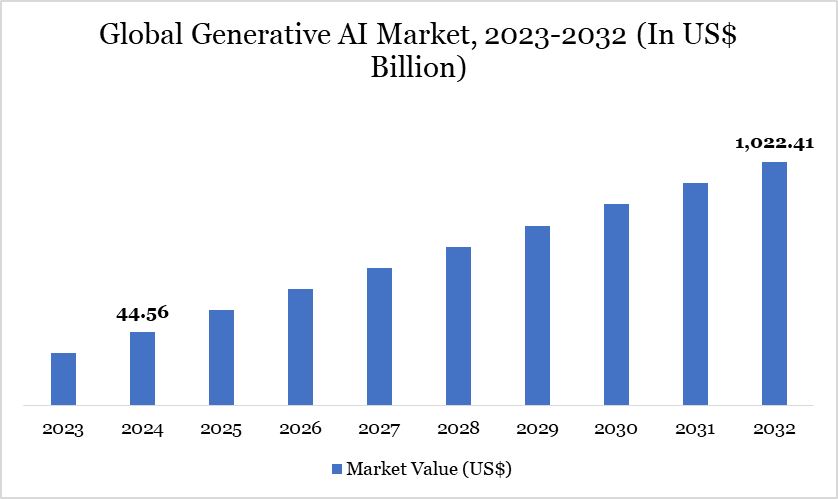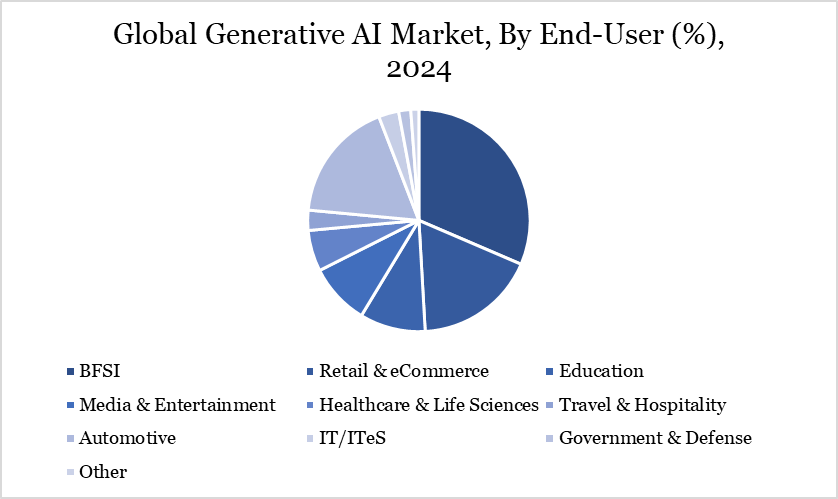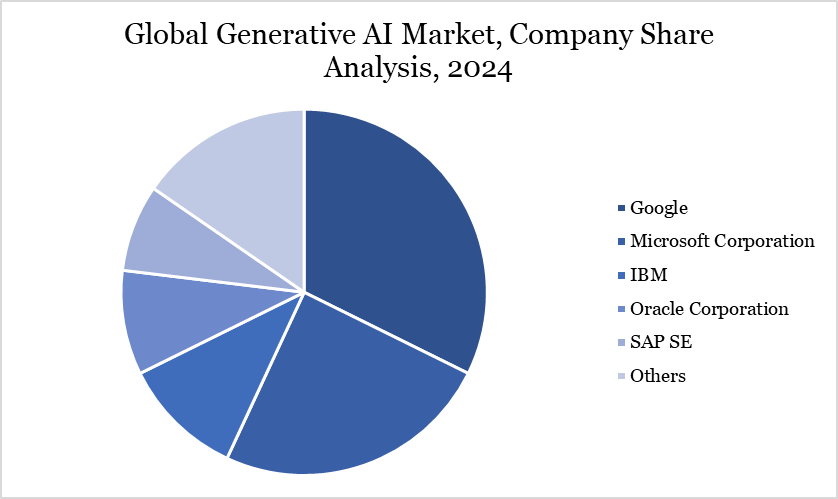Generative AI Market Size
Generative AI Market reached US$ 45.56 billion in 2024 and is expected to reach US$ 1,022.41 billion by 2032, growing with a CAGR of 47.53% during the forecast period 2025-2032.
The increasing application of generative AI across sectors like entertainment, healthcare, marketing and design is driving market growth as organizations perceive its ability to transform content creation, product creation and customer engagement. It is also driven by the general availability of consumer generative AI software such as Google's Bard.
The trend proves the increasing relevance of AI-driven solutions in enhancing operation efficiency and innovation across a number of sectors. In March 2023, for instance, Visual ChatGPT, a model that integrates several visual foundation models and enables users to interact with ChatGPT via graphical user interfaces, was launched by Microsoft Corporation, a US technology company.
Generative AI Market Trend
Some of the key developments in the international generative AI market involve bringing into being use cases like VR games and VR training simulations that yield meaningful efficiency. Consequently, early AI applications in business will be inclined to enhance human ability through a workforce comprising human employees together with intelligent virtual assistants or collaborative robots (cobots). This will greatly drive global market growth.
Nvidia released fresh enterprise Metaverse technologies in January 2023, such as Virtual Reality (VR) and Augmented Reality (AR), to different generative AI tools, like the Omniverse website. The company published its Omniverse portal with RTX and 3D enhancements, along with an early access program for developers who intend to develop avatars and virtual assistants.

For more details on this report – Request for Sample
Market Scope
| Metrics | Details |
| By Type | AI Chatbots, Voice Bots, Interactive Voice Assistants (IVA), Generative AI Agents |
| By Component | Solutions, Managed Services, Professional Services, Training & Consulting, System Integration & Implementation, Support & Maintenance |
| By Business Function | Sales & Marketing, Operations & Supply Chain, Finance & Accounting, Human Resources (HR), IT Service Management (ITSM), Others |
| By Integration Mode | Internal Enterprise Systems, External Communication Channels |
| By End-User | BFSI, Retail & eCommerce, Education, Media & Entertainment, Healthcare & Life Sciences, Travel & Hospitality, Automotive, IT/ITeS, Government & Defense, Other |
| By Region | North America, South America, Europe, Asia-Pacific, Middle East and Africa |
| Report Insights Covered | Competitive Landscape Analysis, Company Profile Analysis, Market Size, Share, Growth |
Generative AI Market Dynamics
Rising Demand for Automated Content Creation and Curation
As the Internet and digital platforms keep evolving, industries like design, gaming, advertising and media have an insatiable thirst for diverse and engaging content. Generative adversarial networks (GANs) and deep learning models are generative artificial intelligence technologies that enable machine-generated content with incredible realism and creativity, enabling content creators to produce vast amounts of different, high-quality multimedia content in a cost-effective and efficient manner.
Generative AI allows models to be multimodal, where multiple modalities can be processed simultaneously, e.g., images and text, thereby increasing their domains of usage and increasing their versatility. Generative AI enhances the collaboration of humans with computers by allowing them to communicate in natural language rather than programming languages.
Generative AI has the potential to transform businesses by creating new paths to automation, innovation and personalization, at the same time cutting down costs and improving customer experience. In March 2023, Grammarly, Inc., a US company that provides AI writing assistant, launched GrammarlyGo, a generative AI feature that enables users to write, edit and personalize text.
High Costs of Training
Gathering and preprocessing large, varied datasets may be expensive and time-consuming; however, training data is essential to teaching AI models to generate accurate and realistic results. Human curation and validation of manual annotation processes are usually required to generate high-quality training data, requiring considerable time and human expertise.
In addition, it might be difficult and expensive to find appropriate data that accurately reflects the desired results across a number of domains, especially for specialized or niche applications. For small businesses and startups, the expensive data preparation requirements might serve as entry barriers, preventing them from leveraging generative AI technology to its full potential.
Generative AI Market Segment Analysis
The global generative AI market is segmented based on type, component, business function, integration mode, end-user and region.

Transforming Content Creation Is Driving Media And Entertainment Growth
For the media and entertainment segment, generative AI technologies allow creative professionals to create large amounts of high-quality multimedia content with little cost, where differentiation and creativity are crucial. Generative AI can be used to create realistic characters, write music, produce visual effects and make targeted recommendations for viewers, yielding engaging and interactive experiences in animation, gaming and other media.
While consumption patterns shift for media and the demand for varied and compelling content grows, the media and entertainment sector continues to invest in generative AI technologies to drive innovation and shape the future of content consumption and creation. In January 2023, BuzzFeed, Inc., an internet media, news and entertainment company headquartered in the US, announced a plan to leverage AI functionality from OpenAI, an American company specializing in AI, to enhance and personalize select content offerings.
Generative AI Market Geographical Share
Rising Investment, Data Diversity and Cultural Adaptation in Asia-Pacific
Asia-Pacific will see the fastest growth, with China, Japan and India leading the countries in AI innovation, driven by vibrant startup ecosystems and government support. City governments in China, such as Shanghai, have also given computer vouchers to AI companies to compensate for the costs of training large language models (LLMs).
The South Korean Ministry of Science and ICT has allocated US$ 642.5 million for investment in companies developing sophisticated AI processors until 2030. The investment will involve the building of additional data centers and partnerships with cloud service providers and makers of generative AI hardware, alongside other projects.
The size of the population and the region's varied language and cultural terrain, as well as the availability of data, make it possible to create generative AI systems that are responsive to the specific likes and nuances of the local population. For example, SB Intuitions, which is a subsidiary of the giant Japanese company SoftBank, is working on local LLMs specifically tailored for the Japanese language. By the end of 2024, SoftBank plans to develop these in-house LLMs fully built, with 350 billion parameters.
Sustainability Analysis
Generative AI model development and deployment are resource-intensive. Training massive models, e.g., GPT-4, is a computationally intensive process that consumes a lot of electricity and emissions as by-products. Advances in AI model architectures, e.g., designing models like DeepSeek, focus on minimizing computational needs, hence reducing energy consumption.
In addition, embracing principles of sustainability-by-design and using transparency measures, including reporting the greenhouse gas profile of AI systems, can inform responsible AI development. Technology firms are putting more investments in renewable energy sources that power data centers, seeking to counterbalance the carbon footprint of AI workloads. Environmental factors point to more environmentally friendly AI development and deployment practices.
Generative AI Market Major Players
The major global players in the market include Google, Microsoft Corporation, Amazon Web Services, Inc., IBM oracle Corporation, Nuance Communications, Inc., FIS, SAP SE, Artificial Solutions and Kore.ai, Inc.

Key Developments
In November 2024, Amazon Web Services (AWS) collaborated with Booz Allen Hamilton and Crayon to create Generative AI Partner Innovation. This deal aims to expand the reach of the Generative AI Innovation Center and help customers build and deploy AI solutions by tapping into industry-specific know-how and vetted methodology to scale generative AI efforts worldwide.
In September 2024, Oracle Corporation and IBM joined forces to enhance Oracle customers' adoption of generative AI by drawing on IBM's experience with technology like OCI Generative AI, Watsonx and third-party models. IBM's collaboration with customers enables them to maximize ROI and minimize computing costs.
Why Choose DataM?
Data-Driven Insights: Dive into detailed analyses with granular insights such as pricing, market shares and value chain evaluations, enriched by interviews with industry leaders and disruptors.
Post-Purchase Support and Expert Analyst Consultations: As a valued client, gain direct access to our expert analysts for personalized advice and strategic guidance, tailored to your specific needs and challenges.
White Papers and Case Studies: Benefit quarterly from our in-depth studies related to your purchased titles, tailored to refine your operational and marketing strategies for maximum impact.
Annual Updates on Purchased Reports: As an existing customer, enjoy the privilege of annual updates to your reports, ensuring you stay abreast of the latest market insights and technological advancements. Terms and conditions apply.
Specialized Focus on Emerging Markets: DataM differentiates itself by delivering in-depth, specialized insights specifically for emerging markets, rather than offering generalized geographic overviews. This approach equips our clients with a nuanced understanding and actionable intelligence that are essential for navigating and succeeding in high-growth regions.
Value of DataM Reports: Our reports offer specialized insights tailored to the latest trends and specific business inquiries. This personalized approach provides a deeper, strategic perspective, ensuring you receive the precise information necessary to make informed decisions. These insights complement and go beyond what is typically available in generic databases.
Target Audience 2024
Manufacturers/ Buyers
Industry Investors/Investment Bankers
Research Professionals
Emerging Companies

